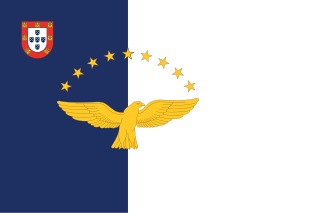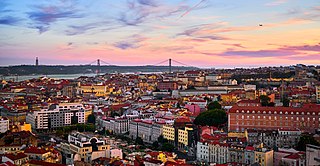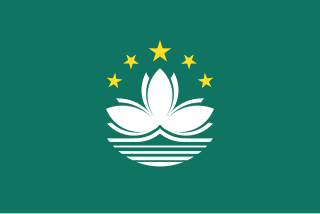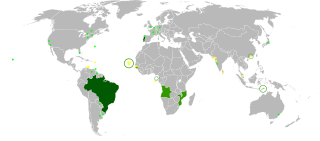| |||||
| Centuries: | |||||
|---|---|---|---|---|---|
| Decades: | |||||
| See also: | List of years in Portugal | ||||
Events in the year 1767 in Portugal .
| |||||
| Centuries: | |||||
|---|---|---|---|---|---|
| Decades: | |||||
| See also: | List of years in Portugal | ||||
Events in the year 1767 in Portugal .


Angola, officially the Republic of Angola, is a country located on the west coast of Southern Africa. It is the second-largest Lusophone (Portuguese-speaking) country in both total area and population, and is the seventh-largest country in Africa. It is bordered by Namibia to the south, the Democratic Republic of the Congo to the north, Zambia to the east, and the Atlantic Ocean to the west. Angola has an exclave province, the province of Cabinda, that borders the Republic of the Congo and the Democratic Republic of the Congo. The capital and most populous city is Luanda.

The Azores, officially the Autonomous Region of the Azores, is one of the two autonomous regions of Portugal. It is an archipelago composed of nine volcanic islands in the Macaronesia region of the North Atlantic Ocean, about 1,400 km (870 mi) west of Lisbon, about 1,500 km (930 mi) northwest of Morocco, and about 1,930 km (1,200 mi) southeast of Newfoundland, Canada.

Brazil, officially the Federative Republic of Brazil, is the largest country in both South America and Latin America. At 8.5 million square kilometers (3,300,000 sq mi) and with over 217 million people, Brazil is the world's fifth-largest country by area and the seventh most populous. Its capital is Brasília, and its most populous city is São Paulo. The federation is composed of the union of the 26 states and the Federal District. It is the largest country to have Portuguese as an official language and the only one in the Americas; one of the most multicultural and ethnically diverse nations, due to over a century of mass immigration from around the world; and the most populous Roman Catholic-majority country.

Lisbon is the capital and the largest city of Portugal, with an estimated population of 544,851 within its administrative limits in an area of 100.05 km2. Lisbon's urban area extends beyond the city's administrative limits with a population of around 2.7 million people, being the 11th-most populous urban area in the European Union. About 3 million people live in the Lisbon metropolitan area, making it the third largest metropolitan area in the Iberian Peninsula, after Madrid and Barcelona. It represents approximately 27% of the country's population. It is mainland Europe's westernmost capital city and the only one along the Atlantic coast. Lisbon lies in the western Iberian Peninsula on the Atlantic Ocean and the River Tagus. The westernmost portions of its metro area, the Portuguese Riviera, form the westernmost point of Continental Europe, culminating at Cabo da Roca.

Macau or Macao, officially the Macao Special Administrative Region of the People's Republic of China (MSAR), is a city and special administrative region of China in the western Pearl River Delta by the South China Sea. With a population of about 680,000 and an area of 32.9 km2 (12.7 sq mi), it is the most densely populated region in the world.

Mozambique, officially the Republic of Mozambique, is a country located in southeastern Africa bordered by the Indian Ocean to the east, Tanzania to the north, Malawi and Zambia to the northwest, Zimbabwe to the west, and Eswatini and South Africa to the southwest. The sovereign state is separated from the Comoros, Mayotte and Madagascar by the Mozambique Channel to the east. The capital and largest city is Maputo.

Portugal, officially the Portuguese Republic, is a country whose mainland is located on the Iberian Peninsula of Southwestern Europe, and whose territory also includes the Atlantic archipelagos of the Azores and Madeira. It features the westernmost point in continental Europe, and its Iberian portion is bordered to the west and south by the Atlantic Ocean and to the north and east by Spain, the sole country to have a land border with Portugal. Its two archipelagos form two autonomous regions with their own regional governments. Lisbon is the capital and largest city by population.

Portuguese is a western Romance language of the Indo-European language family, originating in the Iberian Peninsula of Europe. It is an official language of Portugal, Brazil, Cape Verde, Angola, Mozambique, Guinea-Bissau and São Tomé and Príncipe, while having co-official language status in East Timor, Equatorial Guinea, and Macau. A Portuguese-speaking person or nation is referred to as "Lusophone". As the result of expansion during colonial times, a cultural presence of Portuguese speakers is also found around the world. Portuguese is part of the Ibero-Romance group that evolved from several dialects of Vulgar Latin in the medieval Kingdom of Galicia and the County of Portugal, and has kept some Celtic phonology in its lexicon.

Rio de Janeiro, or simply Rio, is the capital of the state of the same name, Brazil's third-most populous state, and the second-most populous city in Brazil, after São Paulo. Listed by the GaWC as a beta global city, Rio de Janeiro is the sixth-most populous city in the Americas. Part of the city has been designated as a World Heritage Site, named "Rio de Janeiro: Carioca Landscapes between the Mountain and the Sea", on 1 July 2012 as a Cultural Landscape.

Porto or Oporto is the second-largest city in Portugal, the capital of the Porto District, and one of the Iberian Peninsula's major urban areas. Porto city proper, which is the entire municipality of Porto, is small compared to its metropolitan area, with an estimated population of just 291,962 people in a municipality with only 41.42 km2. Porto's metropolitan area has around 2.4 million people (2021) in an area of 2,395 km2 (925 sq mi), making it the second-largest urban area in Portugal. It is recognized as a global city with a Gamma + rating from the Globalization and World Cities Research Network.

Futebol Clube do Porto, MHIH, OM, commonly known as FC Porto or simply Porto, is a Portuguese professional sports club based in Porto. It is best known for the professional football team playing in the Primeira Liga, the top flight of Portuguese football. Founded on 28 September 1893, Porto is one of the "Big Three" teams in Portugal – together with Lisbon-based rivals Benfica and Sporting CP, that have appeared in every season of the Primeira Liga since its establishment in 1934. They are nicknamed Dragões (Dragons), for the mythical creature atop the club's crest, and Azuis e brancos (Blue-and-whites), for the shirt colours. Those colours are in stripes with blue shorts. The club supporters are called portistas. Since 2003, Porto have played their home matches at the Estádio do Dragão, which replaced the previous 51-year-old ground, the Estádio das Antas.

The Portuguese Empire, also known as the Portuguese Overseas or the Portuguese Colonial Empire, was composed of the overseas colonies, factories, and the later overseas territories governed by Portugal. It was one of the longest-lived empires in European history, lasting almost six centuries from the conquest of Ceuta in North Africa, in 1415, to the transfer of sovereignty over Macau to China in 1999. The empire began in the 15th century, and from the early 16th century it stretched across the globe, with bases in North and South America, Africa, and various regions of Asia and Oceania.

The State of India, also referred as the Portuguese State of India or simply Portuguese India, was a state of the Portuguese Empire founded six years after the discovery of a sea route to the Indian subcontinent by Vasco da Gama, a subject of the Kingdom of Portugal. The capital of Portuguese India served as the governing centre of a string of military forts and trade posts scattered all over the Indian Ocean.

Sport Lisboa e Benfica, commonly known as Benfica, is a professional football club based in Lisbon, Portugal, that competes in the Primeira Liga, the top flight of Portuguese football.

The Portugal national football team has represented Portugal in international men's football competition since 1921. The national team is controlled by the Portuguese Football Federation (FPF), the governing body for football in Portugal. Portugal's home matches are played at various stadiums throughout Portugal, and its primary training ground and technical headquarters, Cidade do Futebol, is located in Oeiras. The current head coach of the team is Fernando Santos and the captain is Cristiano Ronaldo, who also holds the team record for most caps and for most goals.

Cristiano Ronaldo dos Santos Aveiro is a Portuguese professional footballer who plays as a forward for Premier League club Manchester United and captains the Portugal national team. Widely regarded as one of the greatest players of all time, Ronaldo has won five Ballon d'Or awards and four European Golden Shoes, the most by a European player. He has won 32 trophies in his career, including seven league titles, five UEFA Champions Leagues, and the UEFA European Championship. Ronaldo holds the records for most appearances (183), goals (140), and assists (42) in the Champions League, goals in the European Championship (14), international goals (117), and international appearances by a European (191). He is one of the few players to have made over 1,100 professional career appearances, and has scored over 800 official senior career goals for club and country.

Sporting Clube de Portugal, otherwise known simply as Sporting, as Sporting CP, or often as Sporting Lisbon, is a football club in Lisbon.

The Primeira Liga, also known as Liga Portugal Bwin for sponsorship reasons, is the top level of the Portuguese football league system. Organised and supervised by the Liga Portugal, it is contested by 18 teams since the 2014–15 season, with the three lowest placed teams relegated to the Liga Portugal 2 and replaced by the top-three non-reserve teams from this division.

The Kingdom of Portugal was a monarchy in the western Iberian Peninsula and the predecessor of the modern Portuguese Republic. Existing to various extents between 1139 and 1910, it was also known as the Kingdom of Portugal and the Algarves after 1415, and as the United Kingdom of Portugal, Brazil and the Algarves between 1815 and 1822. The name is also often applied to the Portuguese Empire, the realm's overseas colonies.

Cape Verde or Cabo Verde, officially the Republic of Cabo Verde, is an archipelago and island country in the central Atlantic Ocean, consisting of ten volcanic islands with a combined land area of about 4,033 square kilometres (1,557 sq mi). These islands lie between 600 and 850 kilometres west of Cap-Vert, the westernmost point of continental Africa. The Cape Verde islands form part of the Macaronesia ecoregion, along with the Azores, the Canary Islands, Madeira, and the Savage Isles.